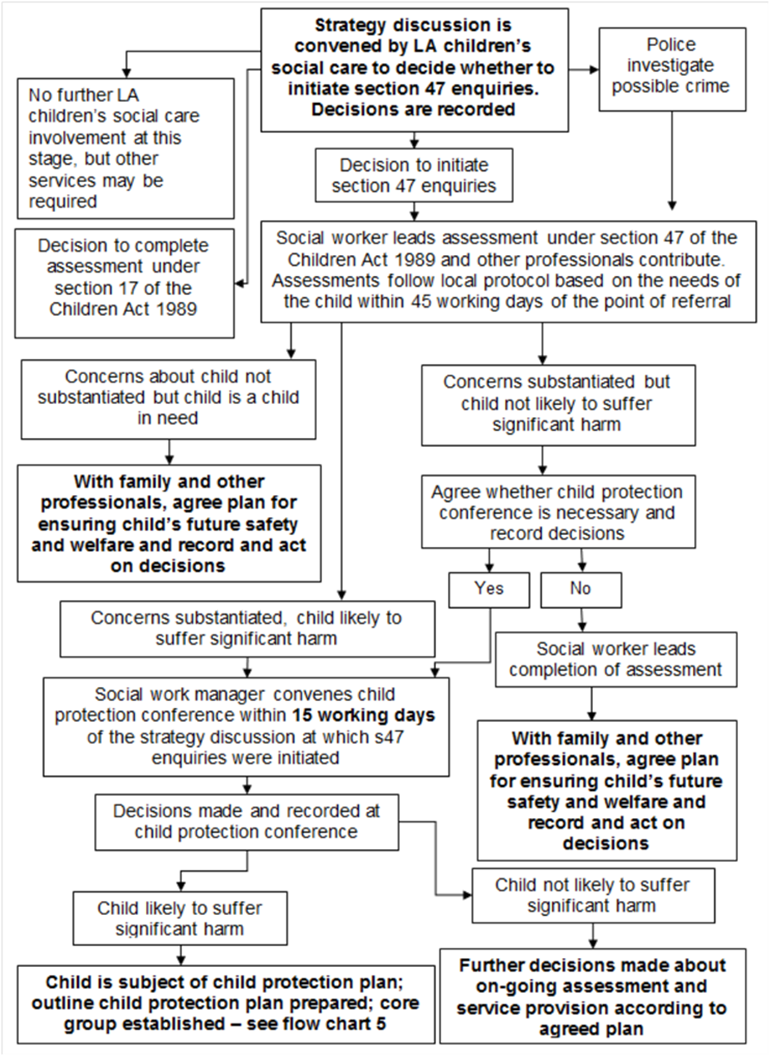
Strategy Discussion
Local Authority Children's Social Care should convene a strategy discussion to determine the child's welfare and plan rapid future action if there is reasonable cause to suspect the child is suffering or is likely to suffer significant harm.
1. Overview
1.1 A strategy discussion should take place whenever there is reasonable cause to suspect that a child is suffering, or is likely to suffer, significant harm. This may take place following a referral or at any other time if concerns arise in respect of child already receiving services from the local authority (the response of the local authority to child protection referrals is covered in section 1.3 of these procedures).
1.2 Best practice is to hold a strategy discussion as a face to face meeting, which can include video conferencing however other methods may be applied (e.g. telephone or conference call).
1.3 For significant injuries to children there must always be Strategy Meetings rather than Strategy Discussions. As such Strategy Meetings may need to be called at very short notice and sometimes out of office hours, invitations to Health Visitors, GPs, Named Nurse, etc. may not be possible; and / or their attendance may not be possible. The core attendance should remain as Children’s Social Care / Police / Doctors.
1.4 The timing of the Strategy Meeting needs to take into account the level of perceived or actual risks being posed to the child and is a decision for Children’s Social Care. Professional discretion needs to be used when determining how quickly a Strategy Meeting is held but in most circumstances it will be within 24 hours of the decision to hold it. In an emergency situation, it may be necessary for Children’s Social Care and Police to hold a telephone strategy to determine the immediate safeguarding response. In some circumstances, such as when planning with an Unborn Baby, all professionals should be aware that a Strategy Meeting will be held at a particular point in the pregnancy and much more than 24 hours’ notice of the meeting should be given.
2. Who should be involved in the strategy discussion
2.1 The strategy discussion should be convened by children’s social care and should be chaired by a designated officer from the local authority. The designated officer should be a registered social worker. The exact make-up of the strategy discussion will vary depending on the circumstances of the presenting situation but should include relevant partner agencies – namely:
- The referring agency
- The police
- Education
- Adult services (e.g. if a parent has a mental illness or there are substance misuse, domestic violence or learning disability issues)
- Specialists as/when required (e.g. the medical consultant if the child is a hospital patient)
- In all cases of alleged or suspected sexual abuse discussion with a paediatrician is essential
- Health representatives from all those involved (e.g. midwife, health visitor, school nurse, GP’s if unable to attend should provide their information via their pro forma – download GP Strategy Form (For all those children where a Strategy / ICPC is held and the primary concern is neglect - information must be sought and shared with the child’s dentist).
3. Purpose of the strategy discussion
3.1 The discussion should be used to:
- Consider the child’s welfare and safety, sharing multi agency information and identify the level of risk faced by the child and impact of concerns;
- Decide what information should be shared with the child and family (on the basis that information is not shared if this may jeopardise a police investigation or place the child at risk of significant harm);
- Considers what further information is needed if an assessment is already underway and how it will be obtained and recorded;
- Decide whether enquiries under section 47 of the Children Act 1989 will be undertaken and whether these are joint or single agency;
- Agree what immediate and short term action is required to support the child, and who will do what by when including preliminary planning of any joint investigation;
- Consider whether legal action is required;
- Agree whether a medical should be undertaken and how this will be achieved e.g. who will take the child, what level of supervision is needed, do Police need to be present;
- Consider the needs of other children who may be affected – e.g. siblings or other children associated with an alleged perpetrator;
- Consider the race and ethnicity of the child and family and consider how this should be taken into account and establish if an interpreter is required;
- Consider if there is insufficient information shared to decide whether a section 47 enquiry should be started or not, decide what action needs to happen to make this decision and arrange for a reconvened strategy meeting to take place;
- Be recorded in line with procedures and be placed on the child’s record.
Police should:
- Be involved in the strategy meeting/discussion ensuring that the representative is able to contribute to the planning of any subsequent Section 47 joint enquiry;
- Discuss the basis for any criminal investigation and any relevant processes that other organisations and agencies might need to know about, including the timing and methods of evidence gathering; and
- Lead the criminal investigation (local authority children’s social care have the lead for the section 47 enquires and assessment of the child’s welfare) where joint enquiries take place;
- Receive details in relation to the reason for the strategy being held.
3.2 In planning the above it is important to bear in mind that the manner in which the enquiry (and interviews with the child and family members within this) is conducted can play a significant part in minimising any distress caused to children (see also police investigations sub-section below). The allocated social worker should explain the purpose of section 47 enquiries to the parents and to the child, (having regard to their age and understanding) and be prepared to answer questions openly, unless to do so would affect the safety and welfare of the child.
3.3 The social worker should also explain that in the event of conflict between the needs and wishes of the parents and those of the child, the child's welfare will remain of paramount consideration in any decision or action. It is important to bear in mind that in the great majority of cases, children remain with their families following section 47 enquiries even where concerns about abuse or neglect are substantiated. As far as possible, section 47 enquiries should be conducted in a way that allows for future constructive working relationships with families.
4. Further strategy discussions
4.1 More than one strategy discussion may be necessary. This is likely to be where the child’s circumstances are very complex and a number of discussions are required to consider whether/when to initiate section 47 enquiries as well as to plan further intervention as the case unfolds.
5. Recording the strategy discussion
5.1 The chair should ensure that a careful record is made of what was discussed and decided at each strategy meeting on the agreed format and circulate this to all parties to the discussion within one working day. A copy of each strategy discussion should be kept on the child’s file.
5.2 For Strategy discussions where the decision to progress to a section 47 enquiry has been agreed, copies of the Strategy Meeting record must be circulated to the respective GPs and Health Visitors / School Nurses, whether or not they have attended, in order that they are kept informed of the circumstances.
6. Action Following a Strategy Discussion

7. Additional Information